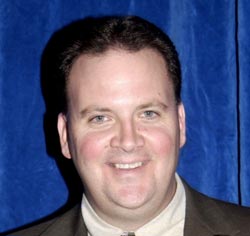|

Skooter Peaco
IHRA Director
of Race Operations
Words by Ian Tocher
1/8/04
  s
a drag racing sponsor and competitor, Floyd
H. "Skooter" Peaco long harbored ideas about
how the International Hot Rod Association should
conduct its business. For instance, along the
way to winning the 2002 IHRA Division 3 Hot
Rod championship, the former motorsports marketing
manager for Summit Racing Equipment says he
would pen his thoughts after each race and present
them soon after to IHRA President Bill Bader. s
a drag racing sponsor and competitor, Floyd
H. "Skooter" Peaco long harbored ideas about
how the International Hot Rod Association should
conduct its business. For instance, along the
way to winning the 2002 IHRA Division 3 Hot
Rod championship, the former motorsports marketing
manager for Summit Racing Equipment says he
would pen his thoughts after each race and present
them soon after to IHRA President Bill Bader.
"I would come home from an event and make a
list of things that bothered me; that I thought
from a competitor's standpoint or from a spectator's
standpoint were wrong. Bill has always been
one to encourage comments, so I would e-mail
them or see him at the next race and I'd give
him a piece of paper and say, 'Hey, you got
20 minutes? Here are the things I think you
need to tune up and these are a list of things
you are doing well.'"
His observations obviously struck a chord,
since on Dec. 1, 2003, Bader officially named
Peaco as director of race operations for the
Norwalk, Ohio-based sanctioning body. In his
new role, Peaco oversees the efforts of Mike
Baker, director of competition and technical
services; Tom Kreager, director of track development
services; Phil Gingerich, area director for
Divisions 4 and 5; Jim Weinert, director of
field operations; and Sherrie Barbour, membership
manager; and reports directly to Bader.
"Now the nice part becomes when you put me
into the equation," Peaco says. "I've been a
spectator, a racer, a sponsor, and a track manager.
You couldn't build a resume better than that
for this particular position."
Peaco, 34, grew up in North Ridgeville, OH,
not far from IHRA headquarters, and was initiated
to drag racing in the early 1970s by his father,
"Skeet," the town's mayor. "He had an all-stock
automatic car that was actually the AHRA L Stock
record holder for a number of years," Peaco
says. "We would travel around following AHRA
and IHRA. I remember getting my homework for
two weeks in advance and doing it in the van
and maintaining some semblance of order while
we were racing."
Late in the decade, however, Peaco's father
didn't think the social atmosphere at the track
was right for his young son, so he got out of
the sport entirely. More than a decade passed
before they returned to the strip in the 10.90-12.90
range with a rebuilt 1956 Chevy four-door wagon
donated by neighbor, longtime friend, and current
IHRA Pro Stock star Carl Baker.
"The biggest thing that I got out of all that
was that my father was not one who sent anything
out to be done. We either made it; or it didn't
exist," Peaco states. "He taught me how to weld
and measure and cut; just taught me everything;
how you put a rear end together, how you put
a transmission together. I really got a hands-on
education in Drag Racing 101. There aren't a
whole lot of guys out there that would have
the guts to cut their car in half and make a
whole new box-tube back end for the thing. We
built all of our motors; there was nothing we
couldn't fix or do. That was pretty cool as
I look back today in the era of store-bought
cars and motors."
Between races, Peaco attended Mount Union College
in Alliance, OH, where he graduated in 1991
with a degree in sports marketing and business.
He says he'd planned to do his senior-year internship
with the NBA's Cleveland Cavaliers in their
group sales office, but instead contacted Bader
at Norwalk Raceway Park on his father's advice.
"His rationale was that you're not going to
get to work with [Cavs president] Gordon Gunn;
you're going to be in a ticket office somewhere.
You'd learn a lot with Bill because you are
going to work next to him," Peaco says. "So
I called him up and Bill didn't even know what
an internship was. I said it meant I'd work
for free, so he said, 'Can you be here tomorrow?'"
Within half a semester Peaco satisfied his
internship requirements, so Bader hired him
and he spent the next eight years at NRP, learning
every job at the track, from ice cream vendor,
to starter, to ticket salesman. "That's really
what he (Bader) wanted to instill in me," Peaco
says. "You can't be a good manager unless you
can run every position."

|